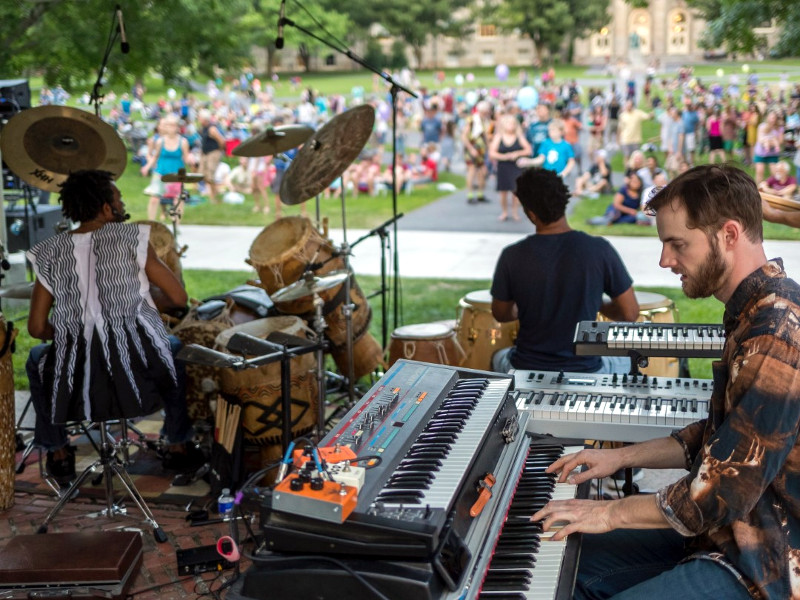News & Events
Charles W. Jermy Jr., former interim dean of the School of Continuing Education, retires after 50 years at Cornell
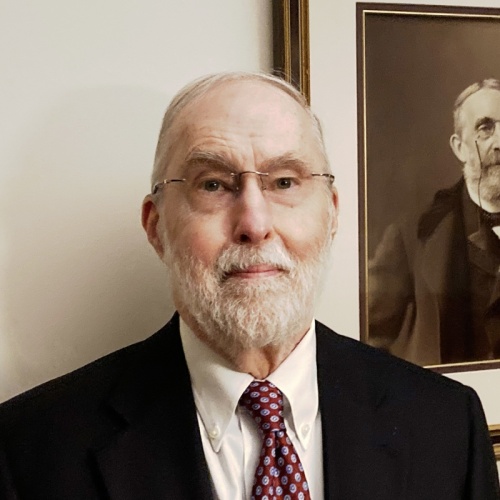
by Shelley Preston,
The Chronicle, April 7, 2023
Innovation and entrepreneurial leadership defined Jermy’s career
It’s hard to imagine a time when email didn’t exist at Cornell, but Charles W. Jermy Jr. remembers. The former dean began his career in 1972 in what was then the Division of Summer Session and Extramural Courses.
As the director at that time of the Advanced Placement Program (now Precollege Studies), Jermy’s team received thousands of postcards with requests for information. Each reply had to be hand-typed and mailed back, requiring countless of hours of labor. Fast forward a couple of decades, and the division—now the School of Continuing Education and Summer Sessions (SCE)—became one of the first Cornell entities to embrace email and provide distance learning opportunities to students around the world.
“Cornell has always been ahead of the technology curve,” Jermy said. “In fact, Bill Gates on a visit to Cornell recognized how essential the internet would be to Microsoft’s future when he saw how many people here were using email to communicate.” Later, that technology, paired with a suitcase of VHS tapes, would enable SCE to offer the first distance-learning credit classes at Cornell.
From those early years to Jermy’s retirement in February, innovation has been the thread that’s kept him interested in and passionate about his work with SCE.
“My PhD studies were in innovation, and so I was looking at the ways universities and colleges in general were thinking about doing that. All of a sudden, I’d landed in a place where I could actually test out those ideas.”
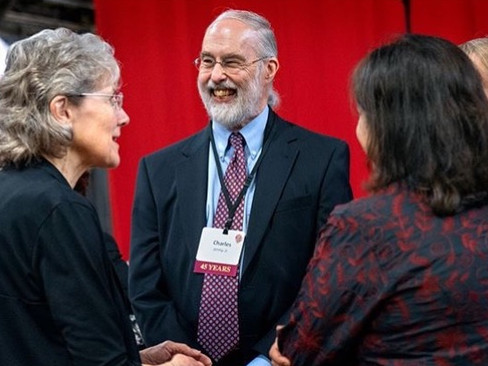
Jermy, who was honored with the title of Senior Associate Dean of the School of Continuing Education and Summer Sessions Emeritus in April for his extraordinary service to Cornell, is delighted that his boldest proposal has been taken up by the University and SCE’s new dean, Mary Loeffelholz: A part-time online bachelor’s degree for nontraditional students.
It was Jermy’s career-long goal for the School of Continuing Education to offer a degree of the highest quality for nontraditional students, a move for which he advocated as a hallmark of Cornell’s “any person, any study” ethos.
“The Covid era demonstrated that Cornell University classes could be delivered online, that they could be as rigorous as on-campus courses,” Jermy said. “It paved the way for realizing our desire to offer an online undergraduate degree.”
Over the past few years, Jermy met often with Michael I. Kotlikoff, provost, and Paul Krause, vice provost for external education and the executive director of eCornell, to discuss how to provide nontraditional students with access to a Cornell degree. Such students would range from working adults and community college graduates to current military service members and veterans, incarcerated individuals, students in Indigenous communities, farmworkers, and others with non-traditional educational backgrounds and paths to higher education. (Read about the proposed degree.)
“Just in the last couple of years alone,” said Krause, “[Jermy’s] leadership and support have enabled a number of collaborative projects with eCornell involving deployment of more online courses to support innovative social impact programs that expand reach to underserved students. I am so grateful for his open and collaborative approach to problem-solving.”
This entrepreneurial approach has been an aspect of all the programs Jermy helped lead over his long tenure at Cornell.
After beginning his career at SCE as a Cornell grad student, Jermy was soon hired as an assistant to the dean and as director of Special Programs in 1973.
“I realized very quickly that we had remarkable independence,” said Jermy. “We weren't asking the university to fund us. We just had to make certain that our programs were self-sustaining.”
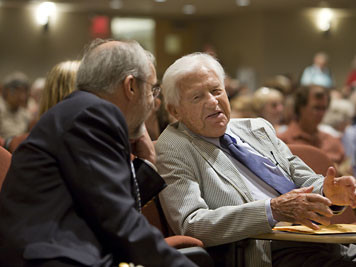
As director of Summer Session and Winter Session, academic terms administrated by SCE, Jermy helped grow both sessions, convincing faculty from around Cornell of the benefits of teaching courses during the summer and winter, testing new teaching methods, developing new courses, experimenting with distance learning/online formats, undertaking field work, and more.
“We had some very prominent faculty members who’d teach undergraduate courses of 400 students during the fall and spring. Then, they’d teach 10 or 12 students during the summer and it was a totally different experience. They’d come back to me and say, ‘You know, I’m glad I listened to you. When I taught in the three-week session, our class would start in the morning, and we would continue our discussions over lunch. Sometimes the class would go for five hours a day, and everyone was so engaged!’ It was wonderful to offer Cornell faculty and students such deep and memorable learning experiences.”
The Advanced Placement Program for high school students also grew under Jermy’s watch into a full-fledged academic and residential experience now called Precollege Studies, one of the oldest and most respected and prestigious precollege programs in the world.
“The Advanced Placement Program began as a reading and study skills program for commuters, then evolved into a National Science Foundation program offering courses in biology, chemistry, and physics. When Cornell decided the students should be able to earn academic credit for those courses, NSF didn’t want to sponsor the program any longer. So, Cornell said, ‘We'll do it anyway.’ The amazing thing about it was that Cornell was the first university to give credit to high school students. Cornell went out on a limb with that effort, and it has turned into an incredible pipeline program.”
In addition to serving as senior associate dean, acting dean, and interim dean, Jermy also facilitated and oversaw many other programs SCE offered over the years, including:
- The development of Cornell’s Adult University.
- The institution of the Visitors’ Noncredit Program in 1975, through which any interested adult could take a Cornell course at a 90 percent discount.
- The beginning of Winter Session in 1975.
- The revitalization of the Cornell in Washington Program.
- The debut of Cornell’s first distance learning credit classes in 1997.
- The creation and expansion of programs to China, along with serving as the Ithaca liaison with Weill Cornell Medicine-Qatar.
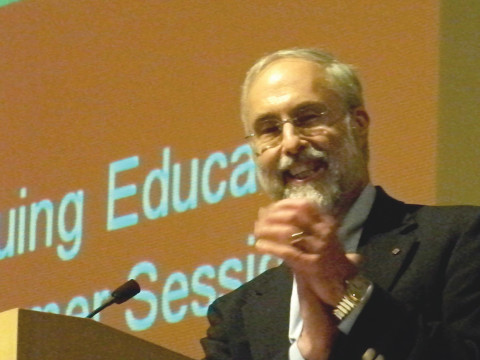
And every Wednesday night in July, he could be found on campus introducing the free Cornell SCE Summer Lecture Series, through which he featured luminaries including M.H. Abrams, Joyce Carol Oates, and Diane Ackerman, a variety of Lincoln scholars and many others.
During a 2015 summer lecture by SCE’s former dean, Glenn C. Altschuler, Altschuler said, “Charles Jermy isn’t often thanked enough...Charles is one of the great university citizens at Cornell. He has spent his career at Cornell, and in the School of Continuing Education and Summer Sessions, where he is the heart and soul of the operation.”
Later, Altschuler would tell Ezra magazine that Jermy helped build programs that have stood the test of time and evolved. “SCE moved into the internet age very early on and has offered courses to students in the Summer and Winter Sessions online... because our mission is to reach learners wherever they are. And we've taken that mission very seriously.”
Although Jermy’s SCE colleagues might have thought of him as reserved and formal in his manner, he wasn’t above getting out of his comfort zone by participating in Cornell Halloween contests, including SCE’s Grease-themed skit and a role as the Big Bad Wolf from the Three Little Pigs, among others.
Jermy said when it came to leadership at SCE, “I always saw myself as a collaborator and a facilitator. Although I was willing to be out in front if I needed to be, I spent my career giving faculty members the resources they needed to do the things they wanted to do. When things didn't go right, what others might have considered mistakes, I always said, ‘We don't make mistakes, we make learning opportunities.’”
Provost Kotlikoff said is he is deeply grateful to Jermy for all he has done for Cornell. “Countless colleagues, students, and community members have benefitted from his knowledge, drive and kindness. We will miss his thoughtful contributions to the work of the university.”
Jermy says he looks forward to seeing where SCE will go under the guidance of Loeffelholz, who became the school’s new dean on March 1. “The friendships and the trust that we've developed during all these years will continue to grow,” Jermy said.
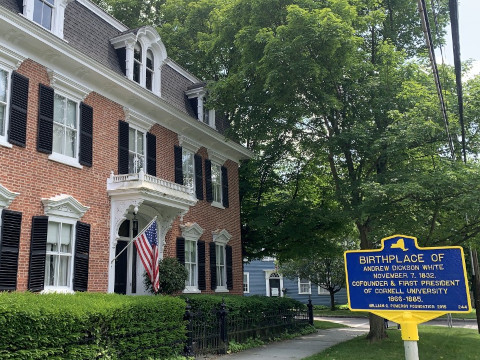
Jermy plans to continue pursuing his passions outside of the institution, including his work as a local historian. In 2015, he was successful in getting a landmark designation for A.D. White’s childhood home in Homer, NY (read the story).
He’s currently the president of the Cortland County Historical Society, and he helps maintain a historic school and attached public library designed by an architect who was a member of Cornell’s first graduating class. The one-room Glen Haven school, located on the shores of Skaneateles Lake, was one of the last of its kind operating in the United States.
Along with spending more time with his family in his cherished hometown of Homer and continuing to send (by email!) the daily inspirational quotes for which he’s known, Jermy is looking forward to taking advantage of some entrepreneurial opportunities that are available for doing good.
“Cornell has been an extraordinary part of my life,” he said. “The people with whom I’ve worked have contributed greatly to the person I am. I look forward to using all that I’ve been given and have learned for the next chapter.”
